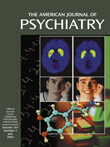To the Editor: The article by Dr. Bruce and colleagues on the treatment of panic disorder by the Harvard/Brown Anxiety Research Project asks why practitioners continue to prescribe benzodiazepines in significant numbers when psychiatric experts/thought-leaders
(1; APA, 1998) advocate SSRIs as the first-line intervention for panic disorder?
I suggest that while psychiatric research reports, literature reviews, consensus statements, and practice guidelines for treating panic disorder may inform the in-office practitioner of a wider clinical experience with anxiolytic and mood-elevating pharmaceuticals, much of the clinician’s actual prescribing behavior can be described by using an operant conditioning model. Practitioners, to a great degree, prescribe the way they do on the basis of whether, over time, the consequences of their prescribing choices are positive or negative. When medication choices are followed by therapeutic successes (significant efficacy with minimum side effects, corresponding to a Clinical Global Impression [CGI]
[2] improvement score of 1 [“very much improved”] or 2 [“much improved”]), those medication choices tend to be repeated because they have been positively reinforced. When medication choices are followed, with significant frequency, by negative outcomes (usually prohibitive side effects or relapse, corresponding to a CGI improvement score of 6 [“much worse”] or 7 [“very much worse”]), those medication choices begin to diminish.
When suggestions by experts for first-line interventions for anxiety disorders are not congruent with the clinician’s cumulative CGI improvement experience, balancing best efficacy with the least side effect burden, treatment guidelines may be pushed aside as the physician and the patient collaboratively construct a treatment plan. For, indeed, in prescribing medication for anxiety disorders, physicians may recognize the advice of experts and have an accumulated experience with prior patients of what works, but they must also address new patients’ questions, opinions, requests, and desires about how to proceed. For example, in considering whether to prescribe benzodiazepines or SSRIs (or other classes of medications) for panic disorder, a physician may be told by a patient, “I don’t want anything that might upset my stomach or have sexual side effects” or “I don’t want anything that might make me drowsy or be addicting.” Thus, selecting a medication is often based as much on what to avoid as on what to choose.
Physicians’ decisions to prescribe a particular medication for panic disorder are thus determined by the following:
1.
Their knowing the literature on efficacy and tolerability.
2.
Recalling their own past clinical experiences, positive and negative (corresponding to CGI improvement scores of 1 through 7).
3.
Obtaining fully informed and truly consenting informed consent from their patients, who, more and more, voice safety and side effect concerns about the medications physicians prescribe and who seek active participation in decision making about their care.

